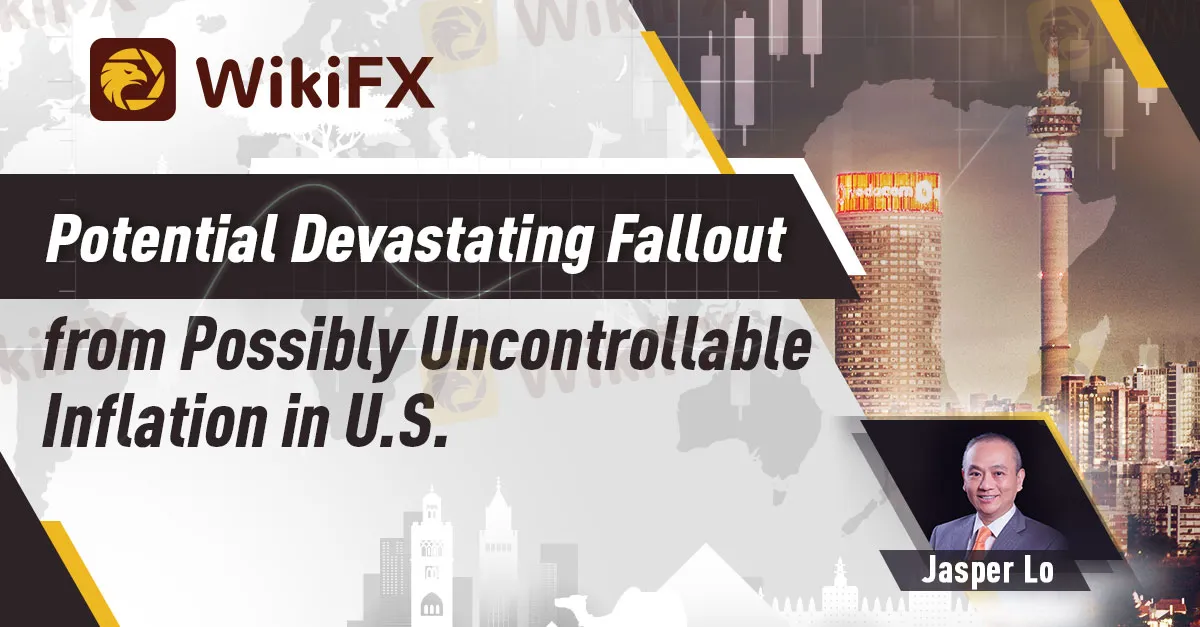简体中文
繁體中文
English
Pусский
日本語
ภาษาไทย
Tiếng Việt
Bahasa Indonesia
Español
हिन्दी
Filippiiniläinen
Français
Deutsch
Português
Türkçe
한국어
العربية
Potential Devastating Fallout from Possibly Uncontrollable Inflation in U.S.
Abstract:Inflation in the U.S. has been underestimated by the Federal Reserve (Fed), thus resulting in a potential economic decline again, warned by Mohamed Aly El-Erian, the chief economic adviser at Allianz. However, his view is not fully shared by others in the financial market, and my opinions are presented herein.

Inflation in the U.S. has been underestimated by the Federal Reserve (Fed), thus resulting in a potential economic decline again, warned by Mohamed Aly El-Erian, the chief economic adviser at Allianz. However, his view is not fully shared by others in the financial market, and my opinions are presented herein.
To mitigate the anxiety raging in the market, the Fed is insistent on the claim that domestic inflation is transient without specifying how long it will last. According to El-Erian, there are more indications that the inflation in the U.S. is escalating, the situation suggesting that it is not a blip as the Fed said. Considering that the Fed is possible to make mistakes in predicting the situation, he is worried that pressure will finally be posed to the faster and more urgent implementation of interest-rate hikes in a bid to prevent inflation from being out of control, which will plunge the American economy into recession again.

I totally agree with El-Erian that the Fed has misunderstood the situation and fully underestimated the exacerbating inflation nationwide. In fact, if it becomes uncontrollable even galloping, the American economy will be doomed to recession and lead asset prices to a steep slump as hyperinflation can exert devastating impacts on the economy, regardless of a pace taken by the Fed of increasing interest rates. Oil prices skyrocketed because of geopolitics in 1979, resulting in the American inflation hitting the rate of 15% and the official interest rate reaching 20%, which caused the severe economic downturn to the U.S., and the total recovery wasnt embraced until 1983.
Therefore, if the Fed stays aloof from the continuously worsening inflation, commodity prices will see an inflationary spiral accordingly. This surge is bound to reduce consumption capacity and rock the American economy as it is highly reliant on domestic consumption. The steady growth of oil prices at present has absolutely fueled inflation. The situation has been misunderstood by the Fed on one hand as interest-rate hikes are likely to be carried out in 2023 according to its monetary policies. On the other hand, these policies cannot keep pace with the development of inflation, thus gradually shaking the confidence held by the financial market in economic recovery, which the Fed must face up to.

In addition, if the inflation sees a moderate rise, and the Fed takes appropriate responses to this, DXY will turn to be strong, and the pressure will be imposed on the gold, universally acknowledged as a financial product with a capacity of combating inflation. On the contrary, if the inflation is out of control, and the monetary policies stipulated by the Fed cannot meet the need, the shooting gold prices will be inevitable under the climate of weak USD and wild inflation. As such, the competence of the Fed is key to controlling inflation at present whereas Powell, the 16th chair of the Fed, is incompetent.
Disclaimer:
The views in this article only represent the author's personal views, and do not constitute investment advice on this platform. This platform does not guarantee the accuracy, completeness and timeliness of the information in the article, and will not be liable for any loss caused by the use of or reliance on the information in the article.
Read more

Trading Psychology – 4 Wise Quotes From The Legendary Mark Douglas
In the world of trading, few books have had the impact of Mark Douglas’ big hit Trading in the Zone. Written almost two decades ago, the book has become a must-read for traders looking to elevate their game to legendary status. While there is so much wisdom to be found in the book, we’ve compiled 5 of the best quotes about trading psychology that every trader should read.

EUR/USD Forecast: New lows ahead of the weekend? ECB, covid and technical all point lower.
Optimism has been weighing on the safe-haven dollar – but not against the euro. The common currency's failure to recover is a sign of weakness that could be followed with falls to fresh lows once the mood sours again – and there are reasons to expect that to happen sooner rather than later.

EURJPY WEEKLY FORECAST. Price Likely To Rise Above 131.000.
The price of EURJPY has been on a steady rise ever since it made a low of 128.808. Other currencies collapsed against the Japanese Yen two weeks ago.

AUD Is Weak Under All-rounded Pressure
A rise in the wake of a fall was seen by DXY last week ascribed to the uncertain time of delisting caused by the Federal Reserve (Fed). However, the reason for the rally of DXY last Friday is the vigorous growth of personal consumption expenditures (PCE) released by the U.S. Bureau of Economic Analysis (BEA).
WikiFX Broker
Latest News
CWG Markets Got FSCA, South Africa Authorisation
Amazon launches Temu and Shein rival with \crazy low\ prices
CySEC Warns Against Unauthorized Investment Firms in Cyprus
JUST Finance and UBX Launch Multi-Currency Stablecoin Exchange
XM Revamps Website with Sleek Design and App Focus
TradingView & Mexico’s Uni. Partnership, to Enhance Financial Education
Something You Need to Know About SogoTrade
Global Shift in Cryptocurrency Taxation: Italy and Denmark Chart New Paths
Webull Introduces 24/5 Overnight Trading to Extend U.S. Market Access
eToro Launches Global-Edge Smart Portfolio: A Balanced Approach to Growth and Stability
Currency Calculator


